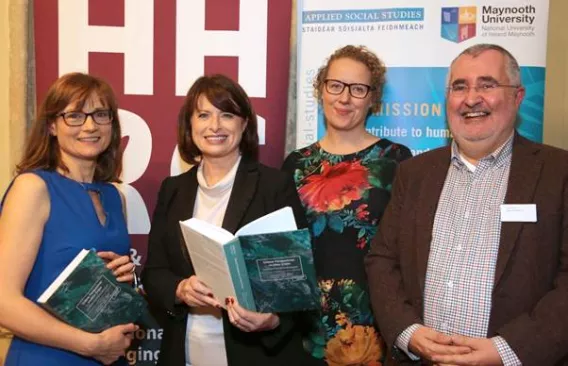The book, Critical Perspectives on Hate Crime – Contributions from the Island of Ireland, co-edited by Jennifer Schweppe (School of Law) and Dr Amanda Haynes (Department of Sociology) of the Hate and Hostility Research Group at UL along with Seamus Taylor of Maynooth University, was launched on Wednesday 18th October by Chief Commissioner of the Irish Human Rights and Equality Commission, Emily Logan. The book explores the manner in which hate crime presents itself north and south of the border, as well as presenting challenges as experienced by practitioners and policy makers in addressing hate crime. Presenting this diversity of contributions, it achieves a unique balance between academics, activists, policy makers and practitioners, and offers perspectives from both the Republic of Ireland and Northern Ireland. It explores the manner in which hate crime presents itself north and south of the border, as well as presenting challenges as experienced by practitioners and policy makers in addressing hate crime.
Launching the book at the Royal Irish Academy, Emily Logan, Chief Commissioner of the Irish Human Rights and Equality Commission said: “It is not the responsibility of victims to avoid being targets of hate crime; it is the responsibility of governments to send a clear message to society that hate crime is not tolerated. This timely publication provides a valuable insight into the dynamics of hate crime in Ireland, and is a valuable contribution to the current debate on modernising Ireland’s legal and policy framework to address hate crime.” Jennifer Schweppe, School of Law, University of Limerick said: ‘‘This volume will be of value not only to scholars, activists and policy makers who are engaged with hate crime in Ireland, but also to international stakeholders who we believe will find much of interest here. The global problem of hate crime is assessed through an Irish lens, an issue which is of international concern given the evidenced rise of hate crime in the UK post-Brexit, and in the US in the aftermath of the election of Donald Trump.’’ Dr Amanda Haynes of the Department of Sociology in University of Limerick said: “Hate crime is part of the lived reality of contemporary Irish society, but the concept has not historically been recognised the institutions of our State. This book addresses that disjuncture. The chapters in this volume bring us face to face with the experience of hate crime victimisation in Irish society, and critically analyse the manner in which our state and civil society organisations respond to those experiences.”